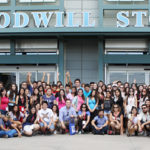Deception never is an appropriate stance for mission workers, a former employee of both the Cooperative Baptist Fellowship and the International Mission Board insisted.
But that’s not the same as telling everything one knows or does, said Kent Parks, now international director of Mission to Unreached Peoples.
“The standard I held to is that I’d never say something dishonest, but I did not tell everything I was doing,” said Parks, who is based in the Dallas area in offices provided by First Baptist Church in Plano.
As an IMB worker and later in a similar capacity with the CBF, Parks lived in a country where his ties to the mission agencies were not publicly disclosed. But, he added: “I never hid the fact that I am a follower of Jesus, though I did not lead with that in most situations. And the phrasing is important. I didn’t call myself ‘Christian’ because that is a political term in many parts of the world. … And I never used the term ‘missionary’ because that’s like saying, ‘Hi, I’m a terrorist, and I’ve come to assassinate your culture.’”
But Parks said he found a way in every conversation to describe himself as a “follower of Jesus.”
“The fact is, people in most parts of the world are followers of some religion,” he said. “And if Americans don’t describe themselves as followers of something, they assume we’re atheists.”
Ethical questions about mission strategy are important, but “it’s a complex situation,” said Parks. “The first ethical question to ask is, ‘Is it fair that many people have no access to hearing and seeing the gospel?’ Obviously, you know where I stand on that.”
Secondly, does honesty and transparency require full disclosure? “American culture has a tendency to say you have to tell the truth, the whole truth and nothing but the truth, and if you don’t, you’re not being truthful. But, to use a poker analogy, I don’t think we have to show our whole hand” to be aboveboard.
Third, when a mission worker chooses a “platform”—an open reason for living in a country—he or she “needs to actually do enough of that occupation to make it legitimate” and not a “cover” for another motive.
Sign up for our weekly edition and get all our headlines in your inbox on Thursdays
The bottom line is that the decision to live as an undisclosed mission worker in a restricted-access country is “a civil disobedience thing—and you must be willing to pay the price if you get jammed up in that country.”
Sometimes, he said, such mission workers who run into legal troubles will distribute “martyr” letters asking for help. Parks thinks an acceptance of such risks is a crucial part of the decision to serve in some parts of the world. “I knew the times when I was skirting the hedge, and I was willing to make the sacrifice.”
Most importantly, mission workers in closed countries must make every effort to keep their actions from endangering local believers.
“If I get jammed up a country for being a witness and I get kicked out, that’s inconvenient for me,” he said. But it can be life threatening for a Christian in that country.
“It’s not my right to jeopardize what (local Christians) are doing. I’m willing to pay the price, and I chose to do so,” but no one can make that choice for others, Parks added














We seek to connect God’s story and God’s people around the world. To learn more about God’s story, click here.
Send comments and feedback to Eric Black, our editor. For comments to be published, please specify “letter to the editor.” Maximum length for publication is 300 words.